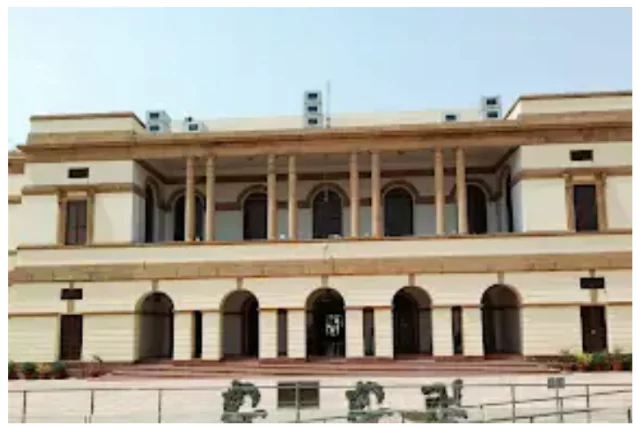The Prime Ministers’ Museum & Library (PMML) has decided not to permit henceforth future donors of Private Papers of eminent personalities to impose indefinite conditions on the declassification of such material.
New Declassification Rules of PMML
- The PMML has decided to permit under normal circumstances, only a five-year embargo from the date of receipt of any new paper.
- In rare cases: The embargo window can extend for up to 10 years at most.
- Declassification: PMML has decided to open up on its own several sets of private papers pertaining to the first Speaker of Lok Sabha G D Mavalankar, Nehru’s niece Nayantara Sahgal, and as many as 2.80 lakh pages pertaining to Pt. Jawaharlal Nehru.
- In 2008, Congress leader Sonia Gandhi reclaimed some papers from Jawaharlal Nehru’s Private Collection that the family had donated to the museum earlier, and also barred access to several sets of these papers.
Enroll now for UPSC Online Course
What are Private Papers?
- The papers are an invaluable and accurate appraisal of the lives and times of these personalities in the form of individual collections coming from families, institutions, universities, and other private donors and Official Records.
- Official Records: These are held by various government departments and ministries, and could comprise letters, records, or file notings, etc. pertaining to the working of various central and state governments constitute another set of papers.
- Personal papers v/s Private papers: The correspondence of a Personality with other eminent personalities of the time, or with institutions, can be part of that person’s Private Collection by virtue of these papers being owned by the person’s family or other private individuals.
- However, correspondence and documents held in personal capacity are excluded from this set.
Declassification of Papers
- Embargoes: The donors sometimes reach an understanding with the recipient institution, imposing unspecified embargo conditions on public access or their declassification before handing over Private Collections in their ownership to archives and museums.
- As a result, the institution holds these papers and conserves them, but it cannot make them public, and researchers cannot access them.
- Declassification Rules:
- The Public Records Rules, 1997, covers declassification of all kinds of records and correspondence in India.
- Definition: Public Records encompasses any records in relation to the central government, and any ministry, department or office of the government including the PMO and the President’s Office.
- These official record declassification responsibility rests with the respective organisations, and that records should ordinarily be declassified in 25 years.
- Records older than 25 years should be appraised by archival experts and transferred to the National Archives of India once the war/operations histories have been compiled.
- For Privately owned papers: The 1997 Rules have no authority in relation to papers owned by private individuals and families, access to which is voluntary in nature, either by means of donation or sale of these documents in some cases.
About The Prime Ministers’ Museum and Library Society
- Founded In: It was founded as the Nehru Memorial Museum and Library Society on 1 April 1966 after the death of India’s first prime minister, Jawaharlal Nehru.
- Location: It is a museum and library housed in the historic Teen Murti campus located south of Rashtrapati Bhavan in New Delhi
 Nodal Ministry: It is an autonomous institution under the Indian Ministry of Culture.
Nodal Ministry: It is an autonomous institution under the Indian Ministry of Culture.- Purpose: To promote original research in modern Indian history with special reference to the Nehruvian era.
- Private Papers:
- PMML has the largest collection of Private Papers in the country, originally belonging to some 1,000 personalities of modern India, encompassing the entire spectrum of its leadership
- It comprises of significant collections of the papers of Mahatma Gandhi, B R Ambedkar, Rajkumari Amrit Kaur, Maulana Abul Kalam Azad, Bhikaji Cama, Chaudhary Charan Singh, and many others
- Recent acquisition: PMML consist of the papers of the legendary environmental activist Sundarlal Bahuguna, donated by his wife, and papers pertaining to Hindi writer and author Yashpal.
- The Jawaharlal Nehru Papers: They were the first set of Private Papers obtained by PMML (NMML) spanning both the pre-Independence and post-Independence periods.
- The Private Papers of Nehru, were transferred to PMML in several batches starting in 1971 facilitated by the Jawaharlal Nehru Memorial Fund (JNMF) on behalf of Indira Gandhi till 1984.
- Subsequently, a substantial collection of Nehru’s Papers from the post-1946 period were handed over to PMML by Sonia Gandhi.
Check Out UPSC CSE Books From PW Store
The National Archives of India:
- National Archives of India is the official depository for Indian government records.
- Administered by: It operates under the Culture Ministry.
- The National Archives’ Private Archives Section: The NAI also acquires Private Collections but acquires only those papers which the donors agree to declassify unless in very rare cases, where the concerns may be pressing and pertain to security or sensitivity.
- These papers have been acquired mainly through donations and gifts from individuals and institutions around the world.
- Personalities: The National Archives has papers pertaining to Mahatma Gandhi, Dr Rajendra Prasad, Dadabhai Naoroji, Purushottam Das Tandon, Maulana Azad, Minoo Masani, Sardar Patel and Keshav Dev Malviya among others.
|
![]() 28 Jun 2024
28 Jun 2024
 Nodal Ministry: It is an autonomous institution under the Indian Ministry of Culture.
Nodal Ministry: It is an autonomous institution under the Indian Ministry of Culture.